ГДЗ Англійська мова 6 клас. Підручник [Мітчелл Г. К., Марілені Малкоґіанні] 2023
Unit 2. Travelling.
Сторінка 19Where can you find the following in this module? Go through the module and find the pictures.
picture A: p.22
picture B: p.24
picture C: p.29
picture D: p.26
picture E: p.20
Сторінка 20
1. Match the pictures with the holiday activities. Then listen and check your answers.
sunbathe - 5
travel abroad - 6
go on a cruise - 3
go sightseeing - 1
buy souvenirs - 8
go hiking - 7
explore a cave - 4
go horse riding - 2
2. A. Look at the pictures. Where did Liv travel to? Listen to the dialogue and check. Then read it out in groups.
Liv travelled to Egypt.
Лів: Привіт, друзі!
Стю: Гей,ти повернувся!
Емі: Як пройшла твоя подорож?
Лів: Це був чудовий досвід.
Білл: Ви відвідували піраміди?
Лів: Звичайно, і Сфінкс. Ми також погуляли Каїром і відправилися круїз по Нілу.
Емі: Ти фотографував?
Лів: Так, але я не маю з собою камери. Тому я не можу тобі показати.
Стю: Отже, що ти ще там робив?
Лів: Я їхала верхи на верблюді. Ну, я спробував покататися на верблюді.
Емі: Ні! На що це було схоже?
Лів: Мені було дуже страшно, чесно кажучи, це не те, що їздити верхи. Верблюди дійсно високі.
Білл: Ти впав?
Лів: Майже. Але мені вдалося залишитися.
Стю: Отже, ти був у подорожі в пустелю?
Лів: Ні. Було дуже жарко. Ой! Я ледь не забув. Ось вам, хлопці, сувеніри аж з Єгипту.
Стю: Піраміда! Дякую, Лів.
Білл: Еммм.. Лів, мій сувенір зламався. У нього немає носа.
Емі: Він не зламаний, Білл. Ось так виглядає Сфінкс.
Білл: Я знаю. Я просто жартую.
2. B. Read again and answer the questions.
1. Where did Liv go on a cruise? - Liv went on a cruise down the Nile.
2. Why can't Liv show them pictures of her trip? - Because she hasn't got her camera with her.
3. What does Liv think of camel riding? - Liv thinks that camel riding isn't like riding a horse. It is scary.
4. Did Liv fall off the camel? - No, she didn't.
5. What did Liv get Stu from Egypt? - Liv got a souvenir pyramid from Egypt to Stu.
6. Why does Bill say his souvenir Is broken? - Because it hasn't got a nose.
Сторінка 21
3. Complete the sentences with the Past Simple of the verbs in brackets.
1. A: Did you like the film? B: Yes. It was great.
2. Last summer we didn't go camping. We went on a cruise around the Mediterranean.
3. Matt and Fay didn't buy a bike. They bought a skateboard.
4. Yesterday, at 5 o'clock, it started raining. So, I stayed at home.
5. A: Did Alice take pictures in Japan?
B: Yes, she took lots of pictures. She loved the place.
4. B. Listen and tick (V) the sound you hear
/t/ helped, walked, finished
/d/ tried, explored
/id/ wanted, started, waited.
5. Talk in pairs. Think of your last holiday. Then ask each other questions.
When did you last go on holiday? - I went on holiday last summer.
Where did you go? - I went to Crimea.
Did you sightseeing? What did you see? - Yes, I did. I saw Crimean mountains and many beautiful shores.
Did you take pictures? - Yes, I have a lot of them.
Did you buy souvenirs? What did you buy? - Yes, I did. I bought a lot of magnets.
Did you have a good time? - Yes, we had a great time.
Сторінка 22
1. A. Look at the means of transport below. Are they land, sea or air transport? Listen and check your answers. What other means of the transport do you know?
Land: underground, motorbike, tram, van;
sea: ferry
air: helicopter
1. B. Complete the sentences with the adjectives below. Then listen and check your answers.
1. When something isn't cheap. It's expensive.
2. When something isn't slow, It's fast.
3. When lots of people like something. It's popular.
4. When there are lots of people in a place. It's crowded.
5. When something isn't safe. It's dangerous.
2. A. Listen, read and put the pictures in the correct order. Write 1-5. 1 - b; 2 - c; 3 - e; 4 - a; 5 - d.
Минулого місяця я був у Бангкоку і хотів спробувати тайську їжу. Адміністратор готелю розповів мені про хороший ресторан біля річки Чао Прайя. Я вирішила піти пішки і оглянути місто. Але незабаром я втомився і сів на автобус. Була велика завантаженість, тому я зійшов і вирішив поїхати на метро. Я легко знайшов станцію метро. Я зійшов через дві зупинки, але не бачив ні річки, ні ресторану. Я не знала, що робити. «Тобі потрібна допомога?» - запитав мене чоловік. Я був такий щасливий! Він дуже добре розмовляв англійською! Я запитав у нього дорогу до ресторану, і він сказав, ох ти на неправильному березі річки. Це з іншого боку». Я їхав на поромі. Потім я взяв тук-тук. Це свого роду таксі, і воно дуже популярне в Бангкоку. Це привело мене в ресторан, і вгадайте що! Він був закритий.
Сторінка 23
2. B. Read again and write T for True or F for False
1 - T; 2 - T; 3 - F; 4 - F; 5 - T.
1. Adam was in Thailand a month ago. True.
2. Adam wanted to go to a place near the Chao Phraya River. I rue.
3. The man spoke to Adam in Thai. False.
4. The man gave Adam the wrong directions. False.
5. Adam didn't have lunch at the restaurant. True.
3. Circle the correct words.
1-couldn't; 2-can, can, couldn't; 3-can't; 4-could, can't.
1. I didn't take my umbrella with me because I couldn't find It.
2. A: Can you speak German?
B: Yes. I can.
A: But you couldn't speak German live years ago.
B: No. but I studied In Germany for a year.
3. I can't buy this dress. It's very expensive.
4. My father could play football very well when he was young, but now he can't.
Complete the sentences with adverbs. Use the adjectives in bold to form adverbs.
1. The taxi driver was terrible. He drove terribly.
2. James is very polite. He always speaks to his teachers politely.
3. Laura is good at languages. She speaks Italian very well.
4. The children are very lazy. They just sit lazily watching TV all day.
4. A. Talk in pairs. Discuss the questions below.
Which means of transport do you usually use? Why? - I usually use car because it is quick and comfortable.
Which means of transport do you like/don't like? Why/Why not? - I like plain, because it is the fastest way of travelling. I don't like bus, because it is too long and stuffy there.
4. B. Write a few sentences about the means of transport you use/like/don't like. Say why.
I use different means of transport. I like to use car if I need to go somewhere around the town. It is quick and comfortable. If I am going to travel somewhere I like to use plain as it is the quickest way of travelling. But I don't line travelling by bus. As for me it is very long and usually not very comfortable.
Сторінка 24
1. Look at the pictures and complete the sentences with the words in the box. Then listen and check your answers.
1. A: Can you help me pack my suitcase? B: OK. Where are your clothes?
2. Judy went to the travel agent's yesterday and booked plane tickets for July.
3. I went to the bank yesterday and I exchanged currency for my trip.
4. Pete didn't drive me to the airport. Called for a taxi.
5. I downloaded my boarding pass onto my smartphone.
6. A: What time did your plane arrive?
B: At 6 a.m.
2. A. Look at the picture. What do you think the two girls are talking about? Listen, read and find out.
The two girls are talking about what they need to do before their trip. Фей: Ви забронювали наш рейс до Парижа?
Сью: Так. Ми з мамою вчора ходили до туристичного агентства. Фей: Чудово, давайте складемо список того, що нам потрібно. Сью: Хороший ідеал По-перше, паспорти. Минулого року моя двоюрідна сестра Френ залишила вдома свій паспорт і спізнилася на рейс.
Фей: Добре. Паспорти. Скільки сумок нам потрібно?
Сью: Давай візьмемо велику червону валізу і твою маленьку синю сумку.
Фей: Ви дивилися погоду в Інтернеті? Чи потрібен нам теплий одяг?
Сью: Я дивиласі. У Парижі холодно. Упакуйте піджаки та джемпери. Фей: Добре, ти теж обміняв гроші?
Сью: Так. мій тато пішов сьогодні вранці в банк і обміняв гроші. Фей: Чудово. Коли ми можемо заселитися?
Сью: Завтра. Ми можемо зробити це онлайн. Ми також можемо надрукувати наші посадкові талони.
Фей: Ми також можемо завантажити їх на наші смартфони.
Сью: Гарна ідея, ох до речі, твої батьки можуть відвезти нас в аеропорт?
Фей: Звичайно. Не можу дочекатися нашого свята!
Сторінка 25
2. B. Read again and answer the questions.
1. What happened to Sue's cousin last year? - She left her passport at home and missed her flight.
2. When did Sue and her mum book the tickets for Paris? - They booked tickets to Paris yesterday.
3. What did Sue check on the Internet? - Sue checked the weather on the Internet.
4. What did Sue's dad do this morning? - He went to the bank and exchanged some money.
5. When can Sue and Fay check in? - Sue and Fay can check in tomorrow.
3. Complete using personal pronouns.
1. A: Give me my mobile phone, Adam. I know you've got it.
B: No. I haven't. I gave it to your brother.
Ask him.
2. Tell us about your trip. We want to know all about it.
3. A: Those shoes are nice! I want to buy them.
B: Aren't they a bit expensive?
4. A: Where's Mr Smith?
B: He is over there. Do you want to talk to him?
4. Look at the pictures below and tick what Tina is taking on her trip.
a, b, c, e, f.
5. Talk in pairs. Imagine that you are preparing for a trip. Ask and answer questions about the things you did or didn't do before your trip. You can use the ideas in the box.
- Did you book our flight to London?
- Yes, I booked it yesterday.
- Great. Did you check the weather there?
- Yes, it should be sunny. Did you pack your clothes?
- I will do it today. And when can we check in?
- Tomorrow morning. Will you go with me to exchange currency?
- Yes. And we also need to load boarding passes.
- Yes, sure.
1. A. Do the quiz and test your knowledge. Then listen and check your answers.
1 - a; 2 - c; 3 - c; 4 - b.
1. Зараз багато людей їздять на електромобілях. Вони підходять для далеких поїздок, тому що їх дешево заряджати, і вони екологічно чисті. Але електромобілі не завжди були популярні. Коли на дорогах з'явилися перші електромобілі?
2. Сьогодні подорожувати кораблем швидко, дешево та безпечно. Але колись подорожувати кораблем йому було важко. У минулому відомі мандрівники здійснювали далекі навколосвітні подорожі. Ці подорожі були небезпечними, і іноді кораблям потрібні були місяці, щоб побачити землю. Скільки часу знадобилося досліднику Фердинанду Магеллану, щоб перетнути Тихий океан у 1521 році?
3. Сьогодні подорожувати літаком легко та швидко. Політ з Лондона в Нью-Йорк займає близько 7 годин. Але колись подорожувати літаком було не так просто. У 1919 році Джон Алкок і Артур Браун здійснили перший безпосадковий переліт через Атлантику. Скільки часу тривав цей політ?
4. Люди почали використовувати поїзди для подорожей у 19 столітті. У 1830 році потяги могли рухатися зі швидкістю близько ЗО км/год. Сьогодні з'явилися нові види потягів, які є дуже швидкими, як-от потяг на магнітній підвісці. З якою швидкістю шанхайський маглевський потяг проїде 30-кілометрову подорож?
1. B. Read again and answer the questions.
1. Why do people use electric cars for long journeys? - People use electric cars for long journeys because they are cheap to charge and they are environmentally friendly.
2. Did travelling by ship use to be fast? - No, it didn't.
3. How did explorers travel around the world? - Explorers travelled around the world by ship.
4. What happened in 1919? - John Alcock and Arthur Brown made the first non-stop flight across the Atlantic.
5. What is the maglev train? - It is a very fast train.
Сторінка 27
2. Complete the sentences with the words in the box.
1. On its first voyage the ship travelled to Australia.
2. It takes about 30 minutes to walk to the beach.
3. I'm reading a book about famous explorers, like Columbus and Magellan.
4. When he was twenty years old. he spent a year travelling around the world.
5. After two months at sea, we saw land.
3. Complete the sentences below. Use the correct form of used to and grammar the words in brackets.
1. Paul didn’t use to go to the youth club, but now he goes every day.
2. A: Did you use to live in London when you were young?
B: No. I used to live in Bristol.
3. Alison used to drive to work, but now she takes the bus.
4. Jane and I used to hang out after school, but now we only hang out on Saturdays.
5. A: Did Julie use to have long hair? B: Yes. she did.
4. A. How much do you know about the explorer Christopher Columbus? Answer the questions below. Then listen to the first half of a radio programme and check your answers.
1. Where was he from? a. Italy.
2. When was he born? a. in 1451.
3. Where did he travel to? a. the Americas.
4. How many voyages did he go on? b. 4.
4. B. Now listen to the rest of the radio programme and write T for True and F for False.
1-T; 2-F; 3-F; 4-T; 5-F; 6-F.
1. Columbus took three ships on his first voyage. True.
2. After three months they found land. False.
3. Near the end of the voyage, the sailors didn't have food or drink. False.
4. The first place Colombus went to was San Salvador. True.
5. Columbus also travelled to India. False.
6. Columbus found out he was In America on his third voyage. False.
5. Use the answers to the questions in activity 4A to write a short paragraph about Christopher Columbus.
Christopher Columbus was an explorer from Italy. He took three ships in his voyage. It was about two months. The weather during their voyage was good. The first place they saw was Salvador. And he never know that he was in America till the end of his life. He thought that he travelled around Asia.
Сторінка 28
1. Look at the adjectives in the box. Which of them have a positive and which a negative meaning? Listen and check your answers.
Positive meaning: interesting, amazing, cool, fantastic, exciting, brilliant, wonderful.
Negative meaning: awful, weird, frightening, horrible.
2. A. Listen to Tim talking to his friend Elisa on the phone about a school trip to a cave and answer the questions.
1. Did Tim enjoy the Journey there and back? No, he didn't.
2. Did he enjoy the visit to the cave? Yes, he did.
2. B. Listen again and choose the correct picture a or b.
1.What time did Tim's class leave for the school trip? - b. 6:30;
2.How did the students explore the cave? - b;
3.What happened in the cave? - a;
4. What time did the students get home? - a. 20:00.
3. A. Read the e-mail and answer the questions below.
1. Who is writing the e mail and to whom? - Carol is writing to Olivia.
2. When did Carol go on a school trip? - Carol went on a school trip last Friday.
3. Where did they go? - They went to the Science Museum.
4. How did they get there? - They got their by coach.
5. How long did It take them to get there? - It took them two hours.
6. What time did they arrive? - They arrived at about 10:30.
7. What did they do there? - They saw old and new inventions, fossils of dinosaurs, they watched a 3D film and did their own experiments.
8. Did Carol have a good time? - Yes, she did.
Шановна Олівія, Як справи? Я сподіваюся, що з тобою все в порядку. Я пішов на шкільну екскурсію минулої п'ятниці, і я чудово провів час. Ми поїхали автобусом до міста та відвідали Музей науки. Ми приїхали туди близько 10:30. Нам знадобилося дві години, щоб дістатися туди через пробку, але ми не заперечували. Нам теж було весело в тренері. Ми провели весь день у музеї, бачили старі та нові винаходи та скам'янілості динозаврів. Ми навіть дивилися чудовий 3D фільм. Але моїм улюбленим місцем була експериментальна кімната. Це було так круто! Ми могли б провести власні експерименти! Що за день! Це була найкраща шкільна екскурсія! Я скоро поговорю з тобою, Керол.
3. D. Write an e-mail to a friend telling him/her about a school trip. Use your notes from activity B.
Dear Mark,
I would like to tell you about our school trip. Last week we went to Kyiv by bus. We arrived there at 11 o'clock and started our excursion. We visited a lot of different places. I had a great time. We arrived home at 11 o'clock in the evening. Come to visit me and we will go with you to visit this beautiful city.
Yours Max.
Сторінка 29
3. B. Think about a school trip. Look at the questions in the speech bubble and make some notes. Then talk in pairs.
When did you go on the trip? - We went on a trip last month.
Where did you go? - We went to Kyiv.
How did you get there? - We got there by bus.
What time did you arrive? - We arrived at 11.
How long did you stay there? - We stayed there till 9 in the evening.
What did you do there? - We went on an excursion.
What time did you get home? - I got home at 11 o'clock in the evening.
Did you have a good time? - Yes, I had a great time.
3. C. Read and complete with and, but, so or because. 1-because; 2-so; 3-but; 4-because/and; 5-and; 6-so.
1. We didn't visit the museum because it was closed.
2. My friends wanted to buy some souvenirs, so we went to the souvenir shop
3. Tina went to Egypt but she didn't buy souvenirs.
4. The journey took two hours because the weather was terrible.
5. We spent the day on the beach and then had lunch at a local restaurant.
6. The place was horrible, so we left.
Сторінка 30
Complete the song with the words in the box. Then listen and check your answers.
I wake up so (1) early, outside It's still dark
I take my board rf head for the (2) skatepark
My friends are there, they're all looking good
Super cool (3) trainers, and tops with hoods
Me and my board Jump on! Let's go!
I never get bored Jump on! Let's go!
After school ends, I skateboard some more
I Just go around, It's a great way to (4) explore
I never (5) take the bus, walk or ride a bike
I've got my board, and that's what I (6) like
Me and my board Jump on! Let's go!
I never get bored Jump on! Let’s go!
The (7) evening comes and It's time to go
jump on my board and skateboard (8) home
No skateboarding at home and that's a shame
So on my computer, I play skateboard (9) games!
 ГДЗ 6 клас Підручник 2023 Мітчелл Малкоґіанні Англійська мова Лінгвіст
ГДЗ 6 клас Підручник 2023 Мітчелл Малкоґіанні Англійська мова Лінгвіст
 Якщо помітили в тексті помилку, виділіть її та натисніть Ctrl + Enter
Якщо помітили в тексті помилку, виділіть її та натисніть Ctrl + Enter 20.11.2023,
20.11.2023,
 5 093,
5 093,
 0
0
 Назад
Назад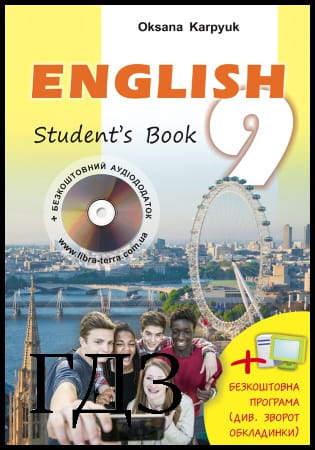
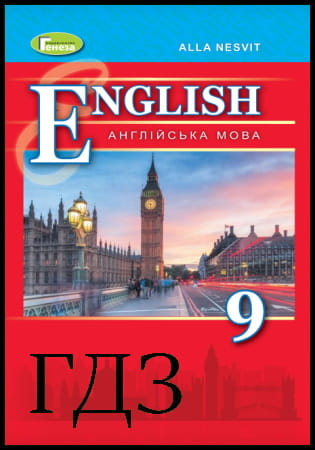
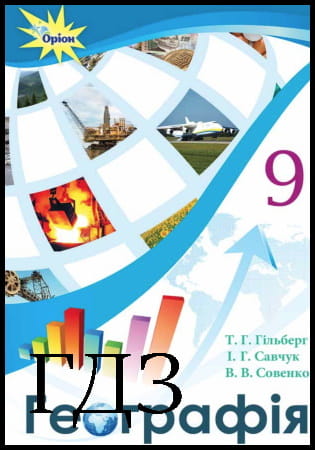
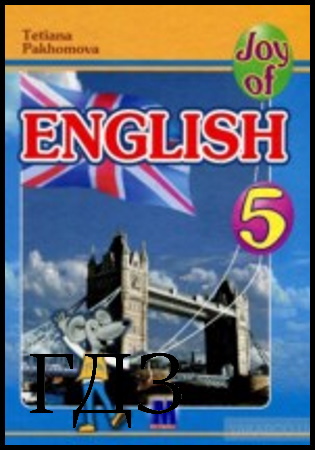
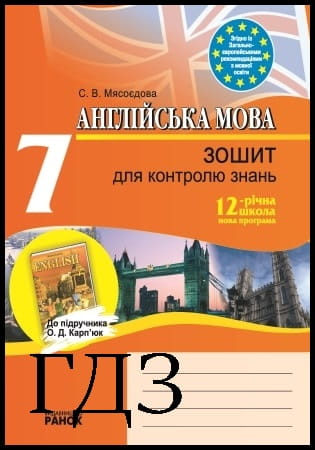
![ГДЗ Природознавство 5 клас. Підручник [Ярошенко О.Г., Бойко В.М.] 2018 ГДЗ Природознавство 5 клас. Підручник [Ярошенко О.Г., Бойко В.М.] 2018](/uploads/posts/2019-04/1555779316_5_p_y_u2018.jpg)
![ГДЗ Основи правознавства 9 клас. Підручник [Наровлянський О. Д.] 2017 ГДЗ Основи правознавства 9 клас. Підручник [Наровлянський О. Д.] 2017](/uploads/posts/2019-02/1550928122_9k_p_n_2017.jpg)
![ГДЗ Українська мова 8 клас. Підручник [Глазова О.П.] 2021 ГДЗ Українська мова 8 клас. Підручник [Глазова О.П.] 2021](/uploads/posts/2021-10/1633720388_8k_y_g_2021.jpg)
![ГДЗ Вступ до історії 5 клас. Підручник [Гісем О.В.] 2018 ГДЗ Вступ до історії 5 клас. Підручник [Гісем О.В.] 2018](/uploads/posts/2019-07/1564163269_5k_i_h_2018.jpg)